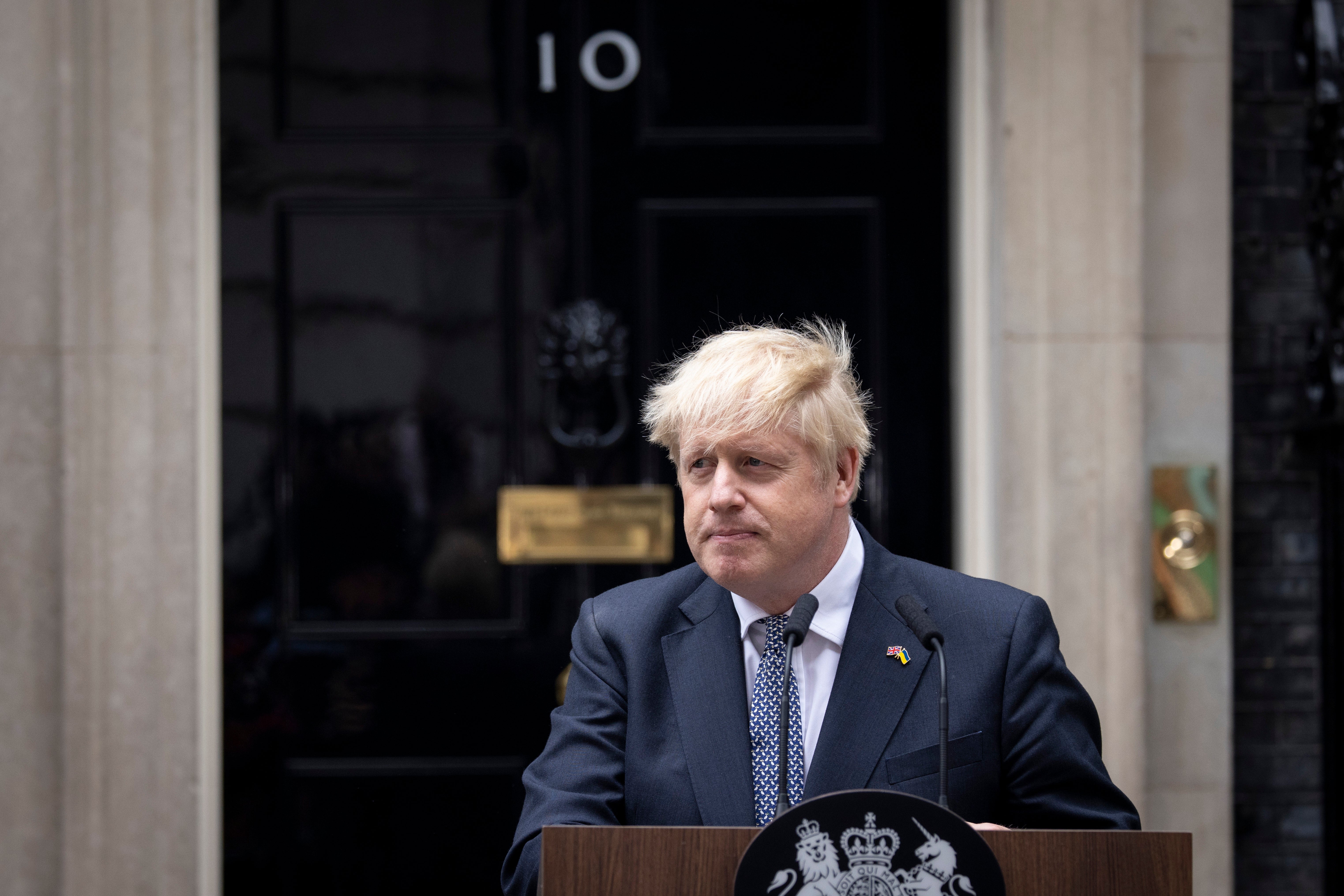Moscow ‘rubbing its hands with glee’ over Boris Johnson departure and will ‘exploit it if they can’
Boris Johnson is now the head of a Potemkin government – a false and hollow structure – that leaves it vulnerable in uncertain times, world affairs editor Kim Sengupta writes
Your support helps us to tell the story
From reproductive rights to climate change to Big Tech, The Independent is on the ground when the story is developing. Whether it's investigating the financials of Elon Musk's pro-Trump PAC or producing our latest documentary, 'The A Word', which shines a light on the American women fighting for reproductive rights, we know how important it is to parse out the facts from the messaging.
At such a critical moment in US history, we need reporters on the ground. Your donation allows us to keep sending journalists to speak to both sides of the story.
The Independent is trusted by Americans across the entire political spectrum. And unlike many other quality news outlets, we choose not to lock Americans out of our reporting and analysis with paywalls. We believe quality journalism should be available to everyone, paid for by those who can afford it.
Your support makes all the difference.“The clown is going,” said Vyacheslav Volodin, the speaker of Russia’s parliament after the fall of Boris Johnson.
“He is one of the main ideologues of the war against Russia until the last Ukrainian. European leaders should think about where such a policy leads.”
Maria Zakharova, spokesperson of the Foreign Ministry in the Kremlin, declared: “The moral of the story is: do not seek to destroy Russia: it cannot be destroyed. You can break your teeth on it – and then choke on them.”
Mr Johnson may regard these insults as badges of honour. He certainly will not object to being called the leader in the support of Ukraine against Russian aggression: although the volume of America’s military and financial support to Kyiv outweighs those from other Western states.
But the UK is now leaderless, without a prime minister who wields any authority. To continue with the Russian theme, Boris Johnson is now the head of a Potemkin government – a false and hollow structure. This could continue for months, and it is a vulnerable place for the country to be in these uncertain times.

In Ukraine, the current state of the British government puts the British nationals captured in the conflict, and being held in the separatist “Donetsk People’s Republic”, at even more risk.
All four prisoners have been fighting for Ukraine in the war. Aiden Aslin and Shaun Pinner were condemned to death by a Donetsk court at the end of last month.
Two others, Andrew Hill, a military volunteer and Dylan Healy, an aid worker, have been charged with the same offences – “forcible seizure of power” and “terrorism” – and there is apprehension that they may face the same brutal sentences.
In London, the Foreign, Commonwealth and Development Office (FCDO) said in a statement: “We condemn the exploitation of prisoners of war and civilians for political purposes and have raised this with Russia.
“We are in constant contact with the government of Ukraine on their cases and are fully supportive of Ukraine in its efforts to get them released.”
There has been talk of the four being freed in prisoner exchanges. One option mooted is that they are freed in return for Viktor Medvechuk, a pro-Russian oligarch, with Vladimir Putin as his daughter’s godfather, who is being held by the Ukrainian authorities.
Moscow is in a strong position when it comes to bargaining on detainees. The total number of Russian soldiers being held by Ukraine has fallen to 550 from 900 in April after a series of exchanges. Russia has more than 5,600 Ukrainian troops in captivity, the figure enlarged by the surrender of 2,500 in Mariupol.
“The Russians will be rubbing their hands in glee at the instability in this country. They will seek to exploit if they can”, said Sir William Patey, one of Britain’s most senior former diplomats, who served as ambassador in some of the most dangerous of diplomatic postings as ambassador to Iraq, Afghanistan and Sudan.
“We can expect the Russians to be active to sow discord, especially if an election was to come soon. Other states like Iran and China will be glad that the UK will be out of the game for the time being.
“There was already malaise in this country in recent times, with the assault on institutions by the government and then Boris Johnson focusing on his survival rather than leading the country, and ministers manoeuvring to replace him. So we have already had a kind of paralysis, and this will get worse.”

Robert Emerson, a security analyst, commented: “When your opponent is weak you test him, and that’s an approach you may see some adversary states take towards the UK now. Allies would also be careful in doing deals, not knowing who would emerge as prime minister. So we are heading for an interesting period.”
An incident which has just taken place in Iran may have been a sign of that “testing”. The state-run Fars news agency in Tehran reported that the Islamic Revolutionary Guard Corps (IRGC) had arrested the British deputy ambassador, Giles Whittaker, for spying.
The FCDO in London dismissed the reports of the arrest as “completely false”.

Simon Shercliff, the British ambassador in Tehran, tweeted that “these reports that our Deputy Ambassador is currently detained are very interesting... He actually left Iran last December, at the end of his posting.”
Iranian officials insist, however, that a British diplomat was, indeed, detained, and warned against “further such activity”.
The day after the story of the “arrest” broke, the UK Ministry of Defence announced that a Royal Navy ship had seized Iranian weapons from boats leaving Iranian ports.
The action was taken because the shipment, which included missiles, was on its way to Houthi forces in Yemen in breach of UN resolutions, it was claimed.
The seizures, by HMS Montrose, took place in January and February, but the operation may not have been publicised to avoid inflaming Iranian sensibilities. There was no discernible reason to announce it now other than – it appears – as a warning to Tehran.
Such shadow powerplay may well continue as Britain sails in uncharted waters at the end of an extraordinary political week which has left the country rudderless.




Join our commenting forum
Join thought-provoking conversations, follow other Independent readers and see their replies
Comments